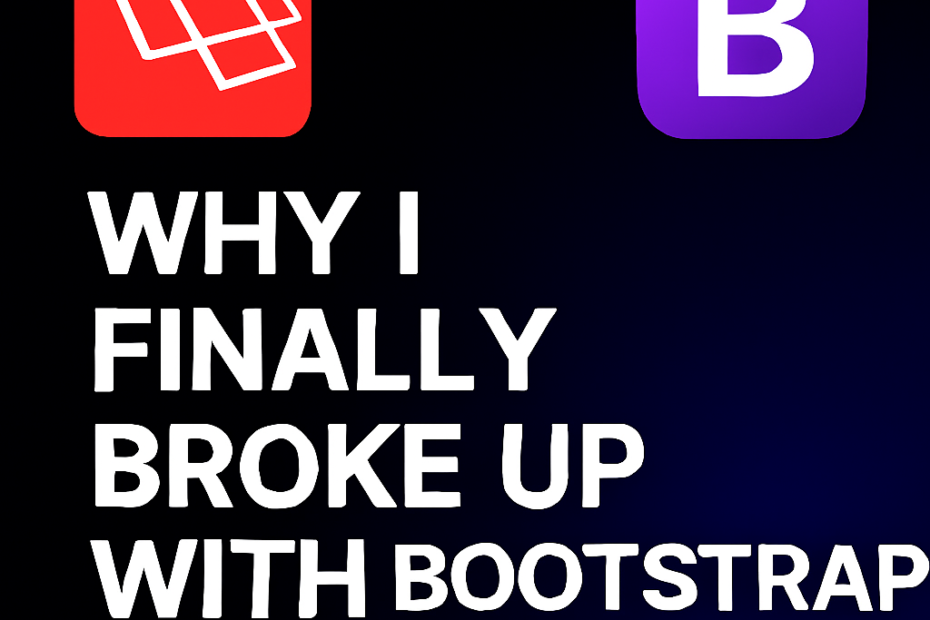If you’ve ever tried to customize a Bootstrap component deeply, you know the pain:
- Fighting against opinionated styles
- Overriding classes just to change padding or colors
- Wrestling with nested selectors and bloated CSS
In Laravel projects, this friction adds up — especially when you’re building dashboards, SaaS UIs, or custom admin panels. I wanted speed and control. Bootstrap gave me speed, but Tailwind gave me both.
🎨 Tailwind’s Utility-First Freedom
Tailwind CSS flipped my workflow:
- No more context switching between HTML and CSS files
- Design in the markup with atomic classes
- Rapid prototyping with consistent spacing, typography, and responsiveness
- PurgeCSS + JIT keeps builds lean and fast
Example: A responsive card in Tailwind vs. Bootstrap
Tailwind
<div class="bg-white shadow-md rounded-lg p-6 md:p-8">
<h2 class="text-xl font-bold mb-2">Dashboard</h2>
<p class="text-gray-600">Welcome back, Sadique!</p>
</div>Bootstrap
<div class="card">
<div class="card-body">
<h5 class="card-title">Dashboard</h5>
<p class="card-text">Welcome back, Sadique!</p>
</div>
</div>Bootstrap is readable, sure — but Tailwind gives me pixel-level control without leaving the markup.
🔗 Laravel + Tailwind = Seamless DX
Laravel 12 now ships with Tailwind as the default frontend stack (via Breeze, Jetstream, and Filament). That means:
- No extra setup — Tailwind works out of the box
- Blade + Tailwind is a dream combo for clean, readable templates
- Filament UI is built entirely with Tailwind, making custom admin panels a breeze
I used to spend hours tweaking Bootstrap themes. Now I build custom UIs in minutes.
📉 Bootstrap’s 2025 Reality
According to recent comparisons12:
- Bootstrap still dominates legacy projects and quick MVPs
- But it’s less flexible, heavier, and harder to customize
- Tailwind’s ecosystem (plugins, UI kits, integrations) is growing faster
Unless you’re maintaining an old codebase or need instant scaffolding, Bootstrap feels dated.
🧪 Real-World Shift: My Laravel SaaS Stack
In my latest Laravel SaaS project, I used:
- Tailwind + Blade for frontend
- Filament + Livewire for admin UI
- Alpine.js for interactivity
- Laravel Pulse + Telescope for monitoring
The result? A clean, scalable, and fully customizable UI — with zero CSS overrides.
🔥 Final Verdict: Tailwind Wins for Me
Bootstrap served me well for years. But in 2025, Tailwind’s utility-first mindset, Laravel-native integration, and DX wins made it the clear choice.
If you’re building modern Laravel apps, Tailwind isn’t just a trend — it’s the future.
References (3)
1Tailwind CSS vs. Bootstrap: Which Framework Wins in 2025?. https://dev.to/dct_technology/tailwind-css-vs-bootstrap-which-framework-wins-in-2025-47ce
2Bootstrap 5 vs Tailwind CSS: Which Is Better For Your Project?. https://www.itpathsolutions.com/bootstrap-vs-tailwind-which-is-better/
3Bootstrap vs Tailwind:Which CSS Framework Should You choose?. https://codepractice.in/blogs/bootstrap-vs-tailwind-2025
